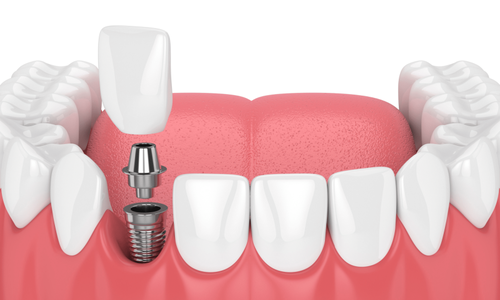When are Dental Implants Recommended by Dentists?
Know when are dental Implants recommended by dentists: Lost your adult tooth, multiple teeth, or entire dental arches due to a mouth trauma/injury, severe tooth decay, or periodontitis? You no longer need to be insecure about your smile and facial appearance, have unclear speech, or face difficulty in eating food! You have many interventions like dentures, bridges, and dental implants to restore your lost tooth or teeth. Thinking which one of them will be right for you? Well, dental implants in Chicago are the best among all as they not only replace the missing tooth but even its roots.
Dental implants are a popular dental restoration option most often recommended by dentists. In this article, we will be talking about dental implants and dental situations where dental implants are most preferred and recommended by dentists over other alternatives.
What are Dental Implants?
Dental implants are the gold-standard, complete, permanent restoration option for missing tooth or teeth. They are composed of titanium or zirconium posts that are screwed into the jawbone of the missing teeth. These posts serve as the strong anchor for the prosthetic replacements which could be a dental crown, bridge, or denture, as per the number of missing teeth.
Tooth implants are most preferred among patients with missing teeth as they function, appear, and feel just like natural teeth. With them, patients don’t even remember that they have something installed in their mouth and so continue to take care of their fake teeth just like they have been doing for their real teeth. The best part is that dental implants have proven success rates of about 98%. This assures patients interested in dental implants do not have to worry about implant failure.
When do Dentists Recommend People to Get Dental Implants?
Tooth implants are recommended to those who are more likely to benefit from them. Here are the signs indicating the need or necessity of having dental implants:
- A lost permanent tooth or several teeth
Tooth implants are the best option for solving the missing/lost tooth or teeth issue. They can fill in the gaps created by the lost teeth and provide a natural smile appearance as well as restore teeth functioning.
- A severely infected tooth that can’t be saved with Root Canal Therapy
If dentists find that a tooth infection is so severe that nothing can save the natural tooth, they recommend tooth extraction. Once an infected tooth is extracted, the most strong and durable restoration called a dental implant is usually recommended. That’s because, with dental implants, there are no risks of having poor dental hygiene as they do not need special care and maintenance. Proper daily brushing and flossing is all that’s required.
- Loose partial or full dentures
Having dentures slipping out of the mouth while talking, laughing, or eating is shameful, especially if there is availability of dental implants. Dental implants can permanently fix dentures and then there would be no more problems associated with loose dental implants.
- Loose dental bridge
Dental bridges are placed by harming the health of natural teeth that lie side-by-side with the gaps created by missing teeth. If they get loose, they cause a lot of headaches. With dental implants, all existing natural teeth are not harmed and the patient can be saved from problems associated with dental bridges.
- A sunken-in face
Missing teeth lead to jawbone resorption over time and sunken-in mouth and chin areas. Dentures cannot help prevent jawbone loss by stimulating jawbone growth which is only possible by tooth roots. As dental implants serve as the roots of the fake teeth, they help preserve jawbone health and density and do not provide a sunken-in facial appearance.
- Sick of living with removable dentures
Removable dentures need to be taken out of the mouth for cleaning and before sleeping. Sometimes, dentures need to be applied with adhesives to keep them secure in the mouth. For people who don’t want to deal with these messy denture adhesives and want more convenient dental care, dental implants are recommended.
- A broken tooth or excessively cracked tooth
In either of these cases, dentists provide two options: a dental crown or a dental implant. In case the crack in the tooth is below the gum line, dentists best recommend pulling the remaining tooth portions out and then replacing the entire tooth structure with a dental implant.
- Ashamed of smiling or laughing
Although missing teeth can affect smile aesthetics, people who get dentures or dental bridges also feel like hiding their smiles. If that’s the case, dental implants can help improve your smile and make you no longer hesitate to laugh by providing a natural-appearing, full intact teeth set.
- Trouble in biting and chewing food
By losing teeth, people face challenges in eating their favourite foods and so have to avoid them. They are not able to properly chew their food and so face digestive problems. Even after getting dentures, eating my favourite meals is still not possible. In that case, dental implants serve as the best, the only solution.
Who Can Get Dental Implants?
Tooth implants are suitable for anyone having one or more missing adult, natural teeth and is not happy living with dentures or bridges. For all those seeking permanent, natural dental restoration, dental implants may be recommended by dentists only when they fulfil the eligibility criteria for getting dental implants.
Here are the factors that decide one’s candidacy for dental implants:
- Gum and jawbone health: Healthy gums and enough jawbone are necessary to have successful dental implants.
- Age and facial development: Adults who have fully developed jaws are allowed to get dental implants.
- Current medications: Anyone who is on blood thinners is not a good candidate for dental implants as they would be at high risk of bleeding.
- Others: Smokers and alcohol abusers are not recommended with dental implants as smoking and alcohol intake can impede healing after implant surgery
- Overall health: Those who are in good general health are at low risk of implant complications or infections and so are good candidates for dental implants.
Step into a life with dental implants by reaching out to us today!
Do you think you need dental implants and you can benefit from them? What’s the next step? Schedule an appointment with our dental implant specialist at First Point Dental Clinic and get started!

